lgbtqia-hub-in-belfast
Article By Kathryn Johnston - Photography by Belfast Telegraph

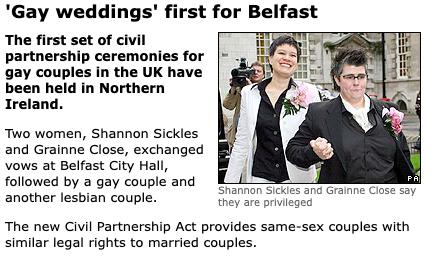
LGBTQIA+ hub in Belfast
Last July I went on a Belfast Pride History tour of Belfast city centre. The tour was led by Richard Orr. He led off the tour at Belfast City Hall, famous for the Belfast Says No protests.
Richard told how the ‘first anti-gay legislation was the Buggery Act w1533 - isn’t it great that we’re standing outside Belfast City Hall talking about buggery’ which was in force until 1861.
‘You could have been put to death if sodomy was proved.
‘In fact, the last two people who were put to death were in 1835. They were put to death for having homosexual relations.
‘That ran all the way through to the Wolfenden Report which was established to examine homosexuality and they recommended that homosexuality should be decriminalised. That was in 1967, in England, 1980 in Scotland and then 1982 here in NI.
The person here who sorted that out is a bit of a local hero, Jeff Dudgeon. He had the backing of the Northern Ireland Gay Rights Association (NIGRA) which was formed in the wake of the Stonewall Riots back in 1969 and the Gay Rights Association and then NIGRA came into being, along with other organisations like Carafriend.
A lot of gay men would have been hassled by the police, they were fed up with this, Jeff Dudgeon was one of them, so what they did was, went to the European Court of Human Rights, and they decided that the government was wrong in outlawing homosexual rights because people had the right to a private life. That was in 1982. And the whole thing about gross indecency was thrown out as well.
Jeff Dudgeon, remember that name. He used to be a Unionist councillor, right here.’
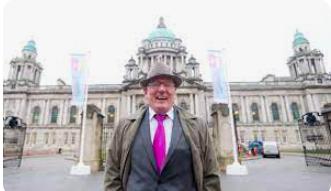
In fact, Councillor Jeff Dudgeon was responsible for one of the most significant changes in Northern Ireland when he brought a case to the European Court of Human Rights (ECHR), Dudgeon vs. the United Kingdom, which forced the UK government eventually to impose the partial decriminalisation of male homosexuality in Northern Ireland in 1982. It was a landmark ECHR case: the first to be decided in favour of LGBT rights. It has formed the basis in European law for all member states, in particular new states joining the EU ever since.
Back on the Pride History tour, Richard Orr gave a rundown on the political situation in Northern Ireland in the seventies and eighties.
‘So around this time the DUP (Democratic Unionist Party, whose leader was the Reverend Ian Paisley, started the Save Ulster from Sodomy campaign in 1977.
‘He could tell change was in the air and wanted to oppose it. He managed to enlist over 70,000 church members.
‘And the literal meaning behind it was, if we change these laws then this will bring God’s curse down upon our country. ‘
‘That’s how strong the rhetoric was and how strong the homophobia was. And for a long time, the Save Ulster from Sodomy campaign, led by Rev Ian Paisley kept going.’
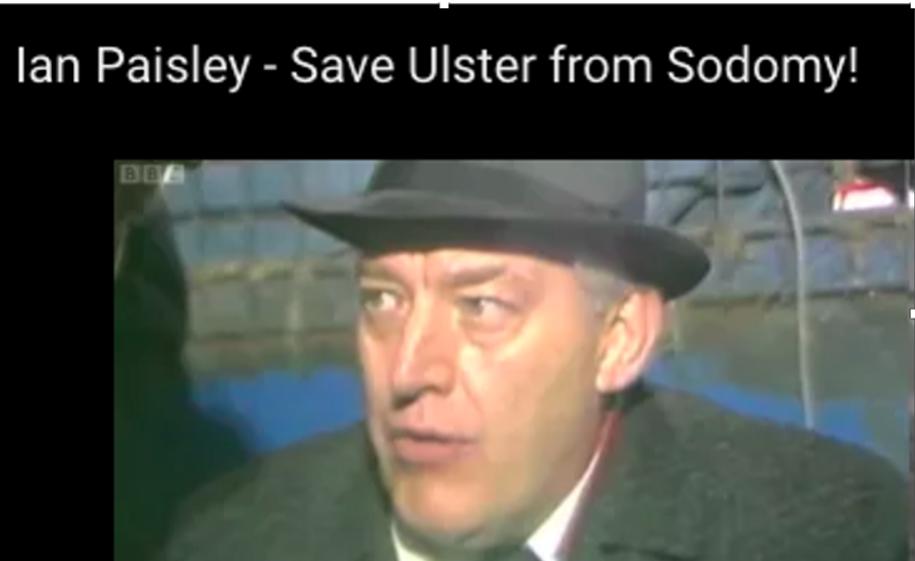
But Richard was quick to point out, ‘the gay community reacted swiftly to this campaign, by mounting their own.’
An immediate push saw t-shirts and posters being produced which cleverly inverted Ian Paisley’s campaign slogan.
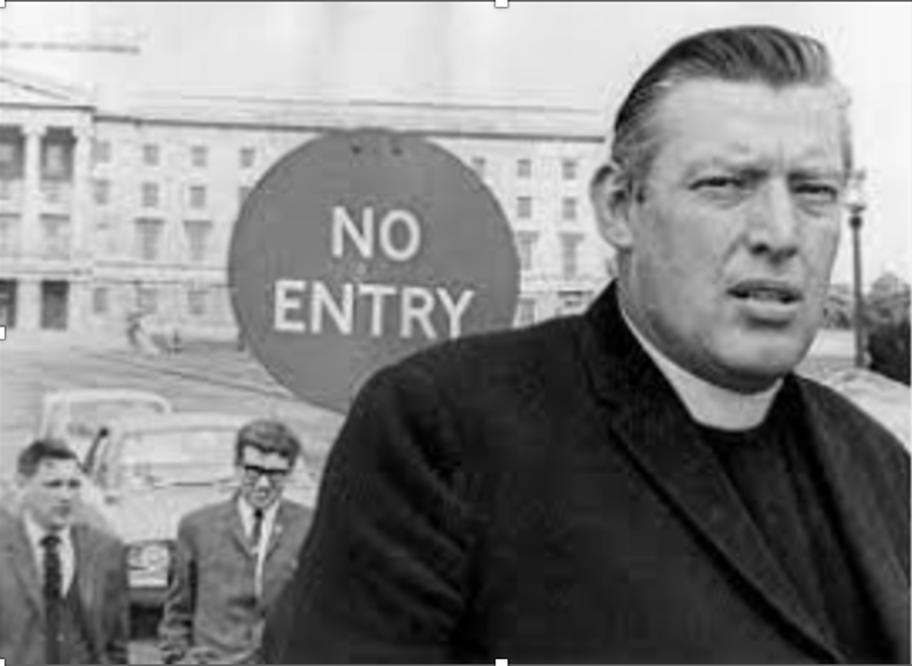
‘So one of the major obstacles to equal marriage was the kind of religiosity we have here. The DUP kept blocking it every time it looked like gay marriage was going to go through. Up until 2020.
‘When the Northern Ireland Assembly was suspended, local politicians were threatened, if you don’t get your act together, Westminster will legislate for it. And of course they wouldn’t get their act together, so Westminster legalised it.
‘And there was nothing they could do about it.’
‘And here we are at the front of the City Hall and in 2004 the Civil Partnership meant that the first civil partnership in the UK took place here, on 19 December 2005 and that was Shannon Sickles, an American lady and her partner,
That is only 16 and a half years ago.’
We’ve come a long way, baby.
And as Richard Orr said last summer, you can see how central Belfast City Hall is to the entire LGBTQIA scene.
Today, demand for services provided by LGBTQIA+ organisations has increased significantly. Many of these organisations receive little or no core funding: covering rent and other overheads can be challenging.
In response to this, Cara-Friend, HEReNI and The Rainbow Project share space in a building commonly referred to as the LGBT Centre. This has helps reduce rent and running costs and has also led to increased collaboration and other benefits.
But there is a huge need for better, improved services. A central hub, in fact.
As other LGBTQIA+ organisations in the city also rent premises and use space in the LGBT Centre, a feasibility study to consider the need for a dedicated LGBTQIA+ Hub is being developed.
And guess who is promoting it?
That’s right, Belfast City Hall.
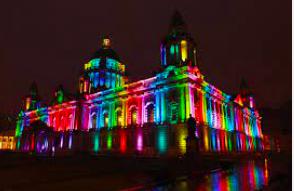
Under their proposals, now out for public consultation, the hub would provide a dedicated building for organisations representing the LGBTQIA+ community in Belfast.
Not only would there be cost benefits, a dedicated LGBTQIA+ Hub would also provide a single point of contact for local and central government, statutory agencies, service providers, service users and other community organisations wishing to engage with the LGBTQIA+ community.
So far there is no budget for a dedicated hub now, the results of this study could provide the evidence base for future funding applications.
In the Belfast City Council consultation, they continue:
‘As part of this feasibility study, we'd like to hear your thoughts on what you'd like to see offered as part of future LGBTQIA+ Hub. You can give your views by completing our survey.
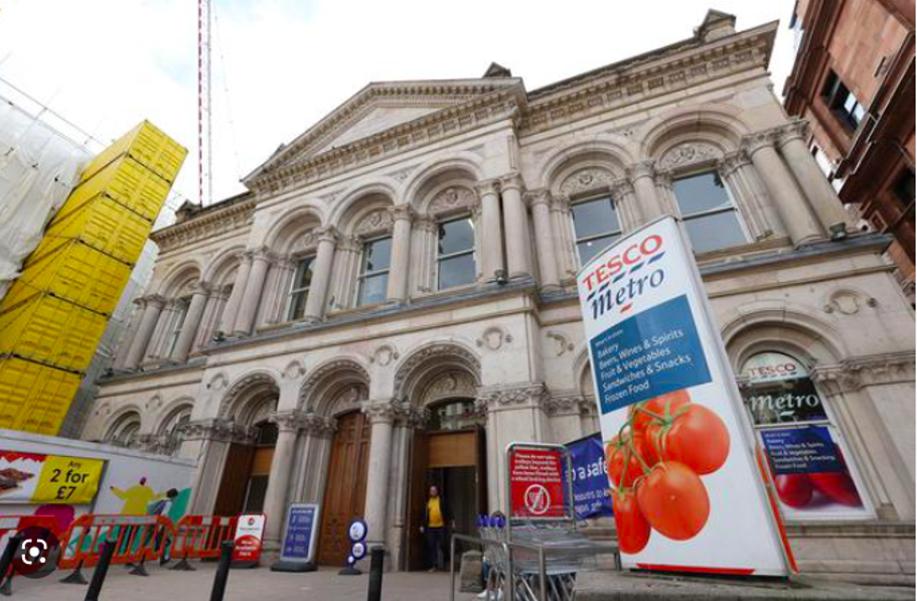
The survey will close at 6pm on Thursday 26th January 2023.
https://yoursay.belfastcity.gov.uk/lgbtqia-hub/survey_tools/consultation-survey
As yet there are no concrete proposals for any LGBTQIA+ hub, but one vacant property has already been mentioned by many supporters of the proposal.
It is the former Tesco Express building on Royal Avenue, which closed a couple of years ago. Before that, it was a bank and is a listed building. It would provide the basis for a fully bespoke LGBTQIA+ safe space in the city centre of Belfast with ample space for hosting meetings and exhibitions, a mental health resource centre, a library, audio visual facilities and a café/restaurant for socialising.
And, to quote Tesco, ‘Every Little Helps’

Last July I went on a Belfast Pride History tour of Belfast city centre. The tour was led by Richard Orr. He led off the tour at Belfast City Hall, famous for the Belfast Says No protests.
Richard told how the ‘first anti-gay legislation was the Buggery Act w1533 - isn’t it great that we’re standing outside Belfast City Hall talking about buggery’ which was in force until 1861.
‘You could have been put to death if sodomy was proved.
‘In fact, the last two people who were put to death were in 1835. They were put to death for having homosexual relations.
The person here who sorted that out was a bit of a local hero, Jeff Dudgeon, he is still alive. He had the backing of the Northern Ireland Gay Rights Association (NIGRA) which was formed in the wake of the Stonewall Riots back in 1969 and the Gay Rights Association and then NIGRA came into being, along with other organisations like Carafriend.
A lot of gay men would have been hassled by the police, they were fed up with this, Jeff Dudgeon was one of them, so what they did was, went to the European Court of Human Rights, and they decided that the government was wrong in outlawing homosexual rights because people had the right to a private life. That was in 1982. And the whole thing about gross indecency was thrown out as well.
Jeff Dudgeon, remember that name. He used to be a Unionist councillor, right here.’
In fact, Councillor Jeff Dudgeon was responsible for one of the most significant changes in Northern Ireland when he brought a case to the European Court of Human Rights (ECHR), Dudgeon vs. the United Kingdom, which forced the UK government eventually to impose the partial decriminalisation of male homosexuality in Northern Ireland in 1982. It was a landmark ECHR case: the first to be decided in favour of LGBT rights. It has formed the basis in European law for all member states, in particular new states joining the EU ever since.
Back on the Pride History tour, Richard Orr gave a rundown on the political situation in Northern Ireland in the seventies and eighties.
‘So around this time the DUP (Democratic Unionist Party, whose leader was the Reverend Ian Paisley, started the Save Ulster from Sodomy campaign in 1977.
‘He could tell change was in the air and wanted to oppose it. He managed to enlist over 70,000 church members.
‘And the literal meaning behind it was, if we change these laws then this will bring God’s curse down upon our country. ‘
‘That’s how strong the rhetoric was and how strong the homophobia was. And for a long time, the Save Ulster from Sodomy campaign, led by Rev Ian Paisley kept going.’
‘But’ Richard was quick to point out, ‘the gay community reacted swiftly to this campaign, by mounting their own.’
An immediate push saw t-shirts and posters being produced which cleverly inverted Ian Paisley’s campaign slogan.
‘So one of the major obstacles to equal marriage was the kind of religiosity we have here. The DUP kept blocking it every time it looked like gay marriage was going to go through. Up until 2020.
‘When the Northern Ireland Assembly was suspended, local politicians were threatened, if you don’t get your act together, Westminster will legislate for it. And of course they wouldn’t get their act together, so Westminster legalised it.
‘And there was nothing they could do about it.’
‘And here we are at the front of the City Hall and in 2004 the Civil Partnership meant that the first civil partnership in the UK took place here, on 19 December 2005 and that was Shannon Sickles, an American lady and her partner,

That is only 16 and a half years ago.’
We’ve come a long way, baby.
And as Richard Orr said last summer, you can see how central Belfast City Hall is to the entire LGBTQIA scene.
Today, demand for services provided by LGBTQIA+ organisations has increased significantly. Many of these organisations receive little or no core funding: covering rent and other overheads can be challenging.
In response to this, Cara-Friend, HEReNI and The Rainbow Project share space in a building commonly referred to as the LGBT Centre. This has helps reduce rent and running costs and has also led to increased collaboration and other benefits.
But there is a huge need for better, improved services. A central hub, in fact.
As other LGBTQIA+ organisations in the city also rent premises and use space in the LGBT Centre, a feasibility study to consider the need for a dedicated LGBTQIA+ Hub is being developed.
And guess who is promoting it?
That’s right, Belfast City Hall.
Under their proposals, now out for public consultation, the hub would provide a dedicated building for organisations representing the LGBTQIA+ community in Belfast.
Not only would there be cost benefits, a dedicated LGBTQIA+ Hub would also provide a single point of contact for local and central government, statutory agencies, service providers, service users and other community organisations wishing to engage with the LGBTQIA+ community.
So far there is no budget for a dedicated hub now, the results of this study could provide the evidence base for future funding applications.
In the Belfast City Council consultation, they continue:
‘As part of this feasibility study, we'd like to hear your thoughts on what you'd like to see offered as part of future LGBTQIA+ Hub. You can give your views by completing our survey.
The survey will close at 6pm on Thursday 26th January.’
https://yoursay.belfastcity.gov.uk/lgbtqia-hub/survey_tools/consultation-survey
Yet there are no concrete proposals for any LGBTQIA+ hub, but one vacant property has already been mentioned by many supporters of the proposal.
It is the former Tesco Express building on Royal Avenue, which closed a couple of years ago. Before that, it was a bank and is a listed building. It would provide the basis for a fully bespoke LGBTQIA+ safe space in the city centre of Belfast with ample space for hosting meetings and exhibitions, a mental health resource centre, a library, audio visual facilities and a café/restaurant for socialising.
And, to quote Tesco, ‘Every Little Helps’
Predictably the DUP still say no, saying that councillors 'must be mindful of pressure on resources' as campaign for new and bigger LGBTQIA+ centre in Belfast gathers pace
But support for the proposal is widespread.
Karen McShane from The Rainbow Project said a new centre will “support the LGBTQ+ community on their journey and allow them to be their true selves whether in work or in family life” and “will save lives”.
Sinn Fein, the SDLP, Alliance, and the Greens have all voiced support for the project.
The Ulster Unionist Party’s Lauren Kerr (who stood unsuccessfully for East Belfast in the 2022 Stormont election, polling at 3%) wrote on Twitter: “An exciting and important step forward towards finally securing a LGBTQ+ hub for Belfast. Please take part and make sure your voice is heard!” followed by a rainbow flag and a transgender flag.
And a gay Newtownards councillor, Michael Palmer, refuted the DUP’s fears in a letter to a local newspaper, also pointing out the urgent need for an LGBTQIA+ hub.
I read with interest [the Newsletter] article regarding the consultation on a new LGBT Centre in Belfast (‘DUP says council must 'be mindful' of public spending when it comes to idea of a new and bigger LGBTQQIA+ centre in Belfast’,
As a gay member of the UUP who completed the consultation, what I want to see is greater connectivity of the LGBT community in Belfast and beyond.
I live in Newtownards and my council Ards and North Down doesn't have an LGBT centre or any regular LGBT events.
Thus, I regularly travel to Belfast to attend LGBT events.
This can be expensive to me in terms of transport though I don't have any other choice for socialisation.
I have long advised my own council that more needs to be done to help the LGBT community in Ards and North Down.
I also think other councils in Northern Ireland could do more.
For me, a new LGBT Centre does not have to be overly expensive.
I noticed the consultation was extensive in asking what services respondents would like to see from it though I think this was to gauge demand for services more than anything else.
The most demanded services would then be implemented depending on funding.
A dedicated place that can be used for events or can organise events for purposes of socialisation for the LGBT community would be all I would want. This would help in tackling loneliness and social isolation and therefore improve mental health’
Hope this provides clarity and thank you for covering this story.
Michael Palmer, Newtownards, UUP Member, Ards and North Down
Three charities in Northern Ireland: The Rainbow Project, Cara-Friend, and Here NI get a large proportion of their funding from public bodies.
But they are just a fraction of the many such charities / non-profit companies now operating in Northern Ireland.
Others include:
Focus: The Identity Trust, Transgender NI, GenderJam, Belfast Butterfly Club, Trans Pride Northern Ireland, SAIL NI (which has recently been subsumed into the UK-wide organisation Mermaids), Newry Rainbow Community, Mid Ulster Pride, Belfast Pride Ltd, and Outburst Arts Festival, while nationwide charity Stonewall also has a presence in Northern Ireland
The first six of the above groups are focussed expressly on transgenderism, reflecting the fact that in recent years many activists have transferred their energies away from campaigns about homosexuality and towards the promotion of transgender and non-binary causes.
In addition to the above, there are many informal groups and collectives active in Northern Ireland.
Among those listed on the website LGBTni.org are: Changing Attitude Ireland, Faith and Pride, Quire: Belfast LGBT Singers, Gender Essence counselling, QueerSpace, Rainbow Refugees, So Me! Anchor transgender support club, and the NI Gay Rights Association.
Public bodies including the NI Human Rights Commission and Equality Commission spend at least part of their time or resources championing LGBTQIA+ causes, and human rights groups such as Amnesty International NI and the Committee for the Administration of Justice have been involved too in the recent past.
On top of that are dedicated LGBTQIA+ associations within trade unions like Unison, Unite, NIPSA, and PCS, as well as the PSNI's LGBT Network and the LGB&T Forum for NHS staff, which also act as pressure groups for addressing gay / transgender issues.
These lists above are not exhaustive.